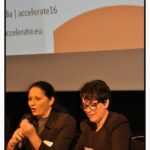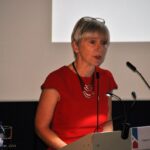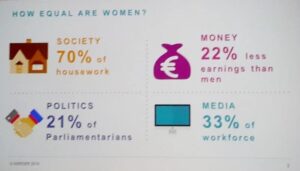Brussels – Two days ago, #7novembre16h34 was trending on Twitter. “From 7 November at 16.34 onwards, women effectively work for free for the rest of the year”, claims the organiser of the social media campaign, highlighting the 15% gender pay gap that exists in France, for instance. Gender inequality continues to exist in the 21st century and that is something that needs to change, finds Sofia Foundation, organiser of the Women in Media 2.0 Conference that was held in Brussels on 26/10/2016. In recognition of this challenge, EACA ‘s European Institute for Commercial Communication Education (edcom) focuses on the theme of gender equality through its annual Ad Venture Student Competition. At the conference “Women in media 2.0”, media houses and employees were encouraged to take direct action and support positive gender models to tackle gender inequality and break gender stereotypes.
When women want to, they can drive the change we want to see

Madi Sharma, an educational entrepreneur and motivational speaker, drove home her ‘no excuses’ mantra to the overwhelmingly female audience:
“I want to say one thing. We, women, are very happy to sit and talk in panels like these but we are simply not doing enough and we need to stop blaming everyone else for that. We have seen that when women want to, they can drive the change they want to see – just look at Iceland and Poland. We are stereotyping all the way, even towards ourselves”.
She continued to provide further inspiration by giving the audience two practical examples of ways that women can make a change as a collective. Firstly, she stressed that women hold 86% of the purchasing power in society and that this power can easily be used to protest against media houses that continue to play into outdated sexist stereotypes of women. Secondly, Sharma pointed out that the strength of blogs and social media demonstrates a new ‘digital and decentralised’ media era. She urged women to seize upon these channels so that they can gain the coverage and exposure that traditional media fails to give them.
There is a need for systemic change in media organisations
Key speaker Nanette Braun, UN Women Ambassador, stressed the need for systemic change in media organisations and highlighted a number of shocking imbalances. These included facts such as:

- Less than 25% of news pieces concern women
- Only 25% of the experts cited in the media are female
- Only 50% of films that came out in 2015 pass the ‘Bechdel’ test (meaning that it contains a scene where two female characters have a conversation about something other than a man).
However, it’s not all doom and gloom. Citing the success of the HeforShe campaign, she stressed that social media provides potential to promote gender equality because media houses have a standing reputation to invest in maintaining an inclusive image:
“Media companies are now realising that gender equality is not only a social ideal, but also a business imperative…Women are half of the human story, media houses who forget this will ultimately deliver poorer products”.

“There is a need to rethink the idea, that we have in this profession, that good journalism means covering war zones…Good journalism also means covering social change, and we are currently in a social revolution – a gender revolution.”
What it all comes down to: promoting positive gender models
Processing the facts and opinions expressed in this Women in Media 2.0 Conference, it is clear that gender equality has become a ‘hot topic’ in the media and advertising industry. Through its Ad Venture Student Competition, EACA and edcom strive to contribute to this important debate by challenging students to create a communications campaign to raise awareness about gender inequality and restrictive gender stereotypes. EACA and edcom organise this competition in collaboration with this year’s client the European Women’s Lobby and will announce the winning campaign on 19 May 2017.

